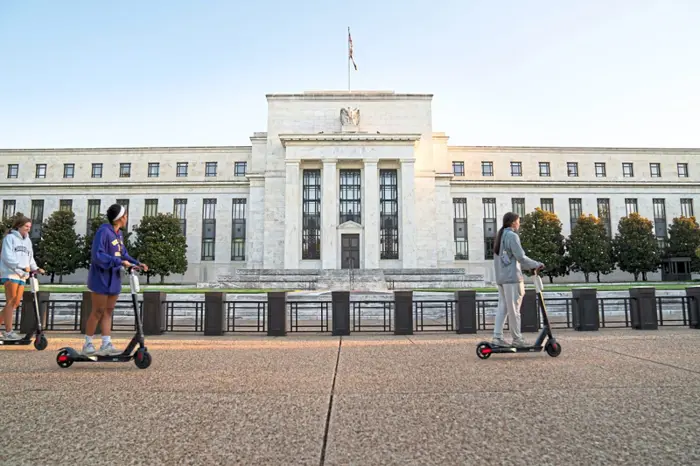
BIX ARTICLE
Fed may be two meetings away from policy mistake
Jul 28, 2024
|
5 min read
Featured Posts
Social Bonds Illustrative Use-Of-Proceeds Case Studies Coronavirus
Jul 06, 2020
|
2 min read
Sustainable Banking Network (SBN) Creating Green Bond Markets
Jul 06, 2020
|
2 min read
Why is Inflation Making a Big Comeback After Being Absent for Decades in the U.S.?
Mar 24, 2022
|
7 min read
SC issues Corporate Governance Strategic Priorities 2021-2023
Mar 29, 2022
|
3 min read

Playing it safe: People ride scooters past the Federal Reserve building in Washington DC. Part of its hesitancy to cut rates is its lack of confidence that inflation will continue to decline to the 2% target rather than just settle at a stable 2.5% to 3%. — Bloomberg
The Federal Reserve’s (Fed) current mindset, however, means that it is more likely to limit itself to signalling the intention to lower rates when the FOMC meets on Sept 17 to 18.
Failing to ease policy in either July or September – an outcome that unfortunately can’t be ruled out – would constitute another policy mistake for a Fed seeking to restore its credibility after fumbling the initial response to building price pressures in 2021.
Part of the Fed’s hesitancy to cut rates is its lack of confidence that inflation will continue to decline to the 2% target rather than just settle at a stable 2.5% to 3%.
Maintaining monetary policy at a restrictive level would increase the probability of hitting that number, but at the significant risk of causing undue damage to employment and the economy.
Indeed, it is far from clear that 2% is the right target.
What was deemed appropriate for yesterday’s world of deficient aggregate demand and a series of beneficial developments on the supply side is less so for a world of global fragmentation, where supply chains are being rewired, and where we see persistent pockets of less flexible domestic supply.
Despite this, it’s highly unlikely that policymakers will revise the numerical inflation target after such a prolonged period of forecast errors and outcomes well above their goal.
A more likely approach would be for the Fed to aim for a very gradual path to lower inflation from here, making it clear that its policy pursuits are now highly sensitive to labour market developments.
The risk of causing undue damage to the economy is amplified by the stress and strain already being felt by lower-income households and small businesses.
Both have seen their pandemic-era cash reserves depleted at a time when it’s become far more expensive to service heavier debt loads.
They can ill afford the effects of an overly restrictive Fed policy – especially when the lagged impact of higher rates is yet to be fully absorbed by the economy and the financial system as a whole.
In recent commentary, the Fed has finally moved to place greater emphasis on risks to the labour market in what it now deems a more balanced assessment overall.
It is only a matter of time until policymakers shift further, to reflect greater concern about an undue weakening in employment and economic activity.
The reason this isn’t happening more quickly – similar to the hesitancy to cut rates next week – is that policymaking has become overly data-dependent following the big 2021 mistake of rushing to dismiss rising inflation as simply “transitory.”
While waiting for September to cut is not a major issue in the grand scheme of things, a further delay would be of greater concern.
And such a delay could easily transpire for an institution that lacks both confidence and sufficient strategic underpinnings. Indeed, all it would take is a negative data surprise in what are inevitably noisy high-frequency numbers.
The likelihood of a soft landing for the economy and preserving US economic exceptionalism would be considerably higher if the Fed were not encumbered by an outdated inflation target, an ill-suited monetary policy framework, and an overly data-dependent mindset.
Instead, the probability is only in the 50% range in my assessment.
And that is not a sufficiently comforting level, especially given high debt, worsening inequality and the range of non-economic uncertainties facing the US and global economies. — Bloomberg
Mohamed A El-Erian is a Bloomberg Opinion columnist. The views expressed here are the writer’s own.
Disclaimer
The information provided in this report is of a general nature and has been prepared for information purposes only. It is not intended to constitute research or as advice for any investor. The information in this report is not and should not be construed or considered as an offer, recommendation or solicitation for investments. Investors are advised to make their own independent evaluation of the information contained in this report, consider their own individual investment objectives, financial situation and particular needs and should seek appropriate personalised financial advice from a qualified professional to suit individual circumstances and risk profile.
The information contained in this report is prepared from data believed to be correct and reliable at the time of issuance of this report. While every effort is made to ensure the information is up-to-date and correct, Bond and Sukuk Information Platform Sdn Bhd (“the Company”) does not make any guarantee, representation or warranty, express or implied, as to the adequacy, accuracy, completeness, reliability or fairness of any such information contained in this report and accordingly, neither the Company nor any of its affiliates nor its related persons shall not be liable in any manner whatsoever for any consequences (including but not limited to any direct, indirect or consequential losses, loss of profits and damages) of any reliance thereon or usage thereof.
YOU MAY ALSO LIKE
ARTICLE
Feb 23, 2026
|
5 min read
ARTICLE
Feb 16, 2026
|
5 min read
ARTICLE
Feb 06, 2026
|
5 min read
ARTICLE
Feb 05, 2026
|
4 min read


